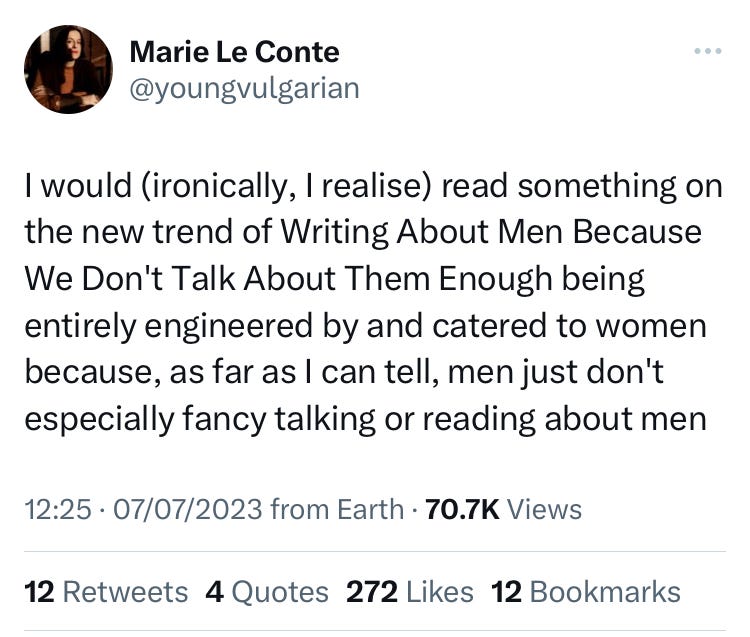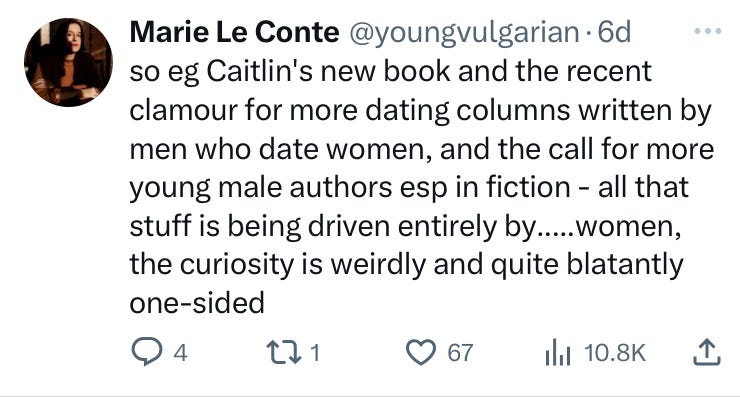What’s Wrong With the “What’s Wrong With Men” Discourse
Are men something more than emotionally malfunctioning women?
I’m going to try and answer this intriguing question from Twitter user youngvulgarian, who posted it last week. The ostensible reason for her tweet was this clip of Caitlin Moran that circulated on Twitter a little while ago, speaking about a book she’s written about men, boys, masculinity, men’s mental health etc. Loads of people had a good ol’ dunk on it including me.
This prominent long read on the same subject appeared in my feed not long before I pressed “post” on this article. So it’s definitely a real phenomenon.
Why do women like the “What’s Wrong with Men” discourse so much, and why do men like it so little?
The first answer is that women are naturally empathetic and see that men aren’t doing so good and want to help them, there isn’t really much more explanation needed than that. Many of the women who engage in this kind of content creation have sons or husbands or brothers and they don’t like seeing them unhappy, adrift and incapable.
The second answer is that material success of women and failure of men means that the traditional feminist explanation that everyone is unhappy because we live in a Patriarchy is obviously inadequate even for people who subscribe to it. It will need to be shored up if they’re going to stick with it and I think that explains why a lot of the inquiry into men’s issues by women often has a kind of frantic, flailing quality; the task of the writer is to whittle down some dismal conceptual scraps in the hope they can be used to plug the growing hole in the dam.
Third, a lot of women writers implicitly understand that our current political and cultural turmoil is primarily driven by polarisation along sex lines, and are worried about where all of this is leading. Concern for male problems is in part a last ditch effort to bring a recently outcast group back into the village before they charge out of the woods and burn it down. Andrew Tate is the totemic representation of this fear, and regardless of his real world influence (I’m very skeptical) he is 100% certain to be mentioned in an article about the problematic inner lives of men and boys.
Finally, some of the most extreme and repellent cultural trends are pretty obviously a powerful male desire for esteem, success and self-actualisation asserting itself through a cultural framework designed to cater for the psychological preferences of women. I think discussing male failure is a way the cultural cognoscenti have of acknowledging this situation isn’t good, and maybe we could find something different to occupy men’s time. Sorry for being vague on this point, I'm trying to not get myself into trouble.
So that’s why women talk about this stuff. But why does it seem that the discussion is of so little interest to men themselves?
Because it’s cringe: Men understand that while being a Man is a biological condition, capital M Manliness is an earned identity, and the bar for earning it is impossibly high. So if you want to discribe yourself as Manly, or Masculine, or an authority on any of these things, you better be Clint fucking Eastwood circa Dirty Harry, and even if you are it’s still cringe. For that reason the subject is always best approached obliquely, and looked at out of the side of your eye.
One of the other reasons men shy away from the discourse is they know before even setting foot on the road that the destination is Therapy. The true cliche, often quoted by Richard Reeves, is that women relate face to face, men relate shoulder to shoulder. That may be why men find therapy and the therapeutic worldview alien and unhelpful. Even the flimsiest male specimen has psychological needs related to accomplishment, strength, usefulness and capability; an atmosphere of unconditional empathy and unrestrained emotional disclosure can be poisonous to those things. Whatever the reason, men understand that therapy (the practice) is mostly just the medical codification of a typically female worldview as objectively true and correct. Most men aren't going to be interested in joining a conversation conducted in that spirit.
A lot of men will in case feel they have plenty of channels to talk about and amongst themselves. Masculinity is the fundamental subject of Joe Rogan's podcast for example, which is literally the most popular one on earth. Maybe it's not obvious to people that discussions about self-sufficiency, personal improvement, fighting, fitness, health, longevity, idiosyncratic and personality/ conspiracy driven takes on history, current affairs, science are implicitly male-coded, yet here we are.
I don't think, and am not trying to convince you, that Rogan's show is great. But you want the average chud to talk about masculinity in a way that they find rewarding, fulfilling and positive, right? I have bad news - for women, this is a realistic best-case scenario of what that sounds like in our current environment and at a mass level. The fact that most women I know detest Rogan and would happily see him taken off the air doesn't undermine anything I’ve said here, but rather summarises the whole problem nicely.
Where does that leave the discourse? A skeptical party might ask - am I expected to male ego, indulge mansplaining and pomposity, and the insufferable male tendency to assume authority belittle others around you? Or alternatively, where men are already doing that stuff to let them get away with it?
Look, I get it. I’ve spent my life around men and boys as a bookish and introverted person. There is no one on earth who is more familiar with how tiresome men are than I am. Nevertheless if you’re committed to knowing them, that’s the position you have to start from: that men are not emotionally maladaptive women and know best how to talk with and to each other.
That will still sound unappealing to many, who will feel “men had it all their own way for millennia, I’m not going to cater to their psychological weaknesses”. When I hear that attitude, or sense it’s at work, I begin to wonder what the problem we’re trying to solve here is - is it male unhappiness, or female unhappiness that men refuse to conform to as psychological model that is palatable to women.
The difference between the sexes is the most elemental one that exists in our species except for that between adult and child. One of the strange consequences of our coming age of transhumanism is that our attempts to transcend those categories is unintentionally reinforcing how concrete, meaningful and ineradicable they are. The differences won’t change, and for reasons I outlined previously, the orientation of powerful cultural institutions and trends away from men isn’t going to change either. What does that leave? In the cultural terms, perhaps the best thing that could happen would be for both sexes to adopt a “non-overlapping magesteria” -type mindset, and give each other some space. But that doesn’t seem terribly likely either, for a variety of reasons - but particularly because “take a step back and give me some space” is the hardest thing for an empathetic person to hear.




Regarding your statement, why do women like the “What’s Wrong with Men” discourse so much, and why do men like it so little?
I actually take issue with women who are so big about bashing on men. Good heavens. We women are not perfect and we as a culture have pushed men to the outer edges of society. We have mocked them, belittled them and basically said "you aren't needed." But in the next breath we are also saying "You should do more. Why don't you do enough? You don't make me happy."
I'm tired of women talking about "what's wrong with men." Instead how about we stay reflective of ourselves, and look at men, eager to celebrate what they have done right?!
And how about us Millennial Women and anyone who wants to join us start speaking up more to the bitter feminists: you've had your turn. The 'I am woman. I can do all things' brand stinks. It's not fun. And it is not enough. Men ARE needed. Women ARE worthy of respect. And one cannot operate without the other for a healthy, prolific society. Men deserve a seat in our lives and they are an important formula to making the world go round. I want to tell the bitter feminists, leave the men alone and let's get back to having men AND women both in the conversation with dignity and honor.
I was trying to explain some of this to my daughter yesterday. One of her friends, a boy, fell of his skateboard and all the girls and his mother (!) crowded round and asked if he was ok. This made him storm off angrily which completely baffled my daughter.